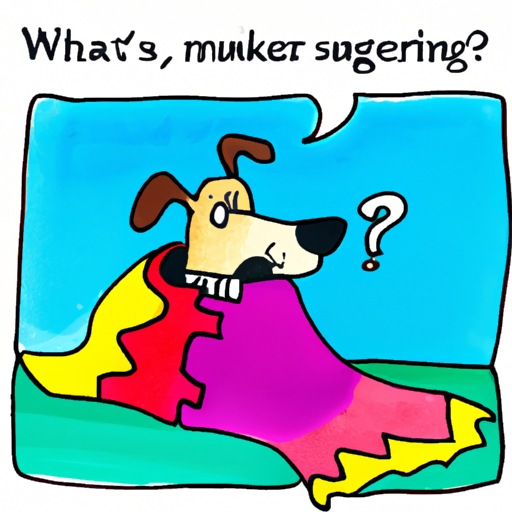Introduction
You are a caregiver. You provide love, warmth, and comfort to your furry friend, but have you ever wondered why your dog chews on blankets? You’ve probably found yourself asking, “Why does my dog do this?” and “Is this behavior normal?” In this article, we delve into the reasons behind this common canine behavior and provide some practical steps you can take to manage it.
Understanding the Behavior: Why Dogs Chew Blankets
Dogs chew on blankets for a variety of reasons. It’s a behavior that can be both puzzling and frustrating for us humans, but when you understand the motives behind it, you can address the issue more effectively. Here are some reasons why your dog may be chewing on your blankets:
- Teething: Just like human babies, puppies go through a teething phase where their gums are sore and chewing helps to relieve the discomfort.
- Boredom: If your dog isn’t getting enough stimulation, either mentally or physically, they may turn to chewing as a form of entertainment.
- Anxiety: Dogs often chew on blankets when they’re anxious or stressed. It’s a self-soothing behavior that can help them cope with their emotions.
- Hunger: If your dog is on a diet or isn’t getting enough food, they may chew on blankets out of hunger.
- Exploration: Dogs explore the world with their mouths, and chewing is a natural part of that exploration.
How to Manage Your Dog’s Chewing Behavior
Now that you understand why your dog might be chewing on your blankets, here are some tips on how to manage this behavior:
- Provide Chew Toys: Instead of your blankets, give your dog plenty of dog-friendly chew toys. This will give them an appropriate outlet for their chewing instincts.
- Ensure Adequate Exercise: Regular physical activity can help to alleviate boredom and anxiety, reducing the need to chew.
- Consider Diet Changes: If your dog is chewing because they’re hungry, consider adjusting their diet to ensure they’re getting enough nutrients.
- Seek Professional Help: If the chewing is due to anxiety or stress, a professional dog trainer or behaviorist can provide valuable insight and assistance.
Possible Dangers of Blanket Chewing
While blanket chewing can seem like a harmless habit, it can pose some potential dangers to your dog. Here’s a simple table illustrating these risks:
| Potential Danger | Explanation |
|---|---|
| Choking hazard | Small pieces of blanket can become lodged in your dog’s throat |
| Digestive issues | Ingested materials can cause blockages in the digestive tract |
| Dental problems | Constant chewing can lead to tooth damage and gum disease |
What to Do If Your Dog Ingests a Blanket
If your dog ingests a blanket, it’s crucial to seek veterinary care immediately. Signs that your dog may have ingested part of a blanket include vomiting, loss of appetite, lethargy, and changes in bowel movements.
FAQ
Q: Is it normal for dogs to chew on blankets?
A: Yes, it’s a common behavior that can be attributed to several causes such as teething, boredom, anxiety, hunger, or exploration.
Q: Can chewing on blankets harm my dog?
A: Yes, it can pose a choking hazard, lead to digestive issues, or cause dental problems.
Q: What should I do if my dog has ingested part of a blanket?
A: Seek veterinary care immediately. The ingested material can cause blockages in the digestive tract which can be life-threatening.
Q: How can I stop my dog from chewing on blankets?
A: Provide chew toys, ensure they get enough exercise, consider diet changes, and seek professional help if needed.
Remember, as a caregiver, your actions can significantly influence your dog’s behavior. Understanding why they chew on blankets and taking appropriate steps to manage this behavior can lead to a happier, healthier pup.



